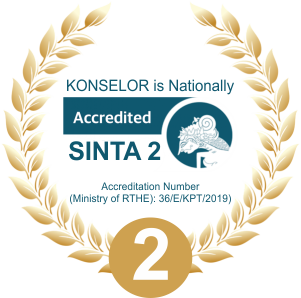Hubungan antara Locus Of Control dan Efektivitas Komunikasi antar Pribadi dengan Problem Focused Coping
 ), A Muri Yusuf(2), Marjohan Marjohan(3),
), A Muri Yusuf(2), Marjohan Marjohan(3), (1) Universitas Negeri Padang
(2) Universitas Negeri Padang
(3) Universitas Negeri Padang
 Corresponding Author
Corresponding Author
Copyright (c) 2017 Konselor
DOI : https://doi.org/10.24036/02016516490-0-00
Full Text:
 Language : en
Language : en
Abstract
Problem focused coping need to be possessed by every individual. The purposes of this research were to described locus of control, the effectiveness of interpersonal communication, problem focused coping,the correlation between locus of control with problem focused coping, andthe correlationbetween the effectiveness of interpersonal communication with problem focused coping.This research was descriptive & correlation research by using quantitative approach. Data were collected through a Likert scale questionaire and locus of controlby using inventory Rotters Internal-External Locus of Control (I-E Scale), which was the validity and reliability has been tested. The data were analyzed by percentage technique and product moment correlation. The finding of research are: 1)locus of control were in the middle range between internal locus of control and external locus of control with an average as big as 11.46, 2) the general level of effectiveness of interpersonal communication is in high category, 3) the general level of problem focused coping is in high category, 4) there is correlation between locus of control withproblem focused coping, and 5) there is correlation betweeneffectiveness of interpersonal communicationwithproblem focused coping.
Keywords
References
A Supratiknya. (1995). Komunikasi Antar-pribadi Tinjauan Psikologis. Yogyakarta: Kanisius.
Alo Liliweri. (1997). Komunikasi Antar-pribadi. Bandung: PT Citra Adityabakti.
Devito. Joseph A. Tanpa Tahun. Komuni-kasi Antarmanusia. Terjemahan oleh Agus Maulana. (1997). Jakarta: Professional Books.
Eko Sujadi. (2012). “Korelasi antara Keaktifan Mengikuti Layanan Konseling Kelompok dengan Efektivitas Komunikasi Antar Pribadi Siswa Kelas VIII3 Sekolah Menengah Pertama Negeri 34 Pekanbaru”. Skripsi tidak diterbitkan. Pekanbaru: Universitas Islam Negeri Sultan Syarif Kasim Riau.
Esti Trisnaningtya & Mochamad Nursalim. (2010). Penerapan Latihan Asertif untuk Meningkatkan Keterampilan Komunikasi Interpersonal Siswa. Jurnal Psikologi Pendidikan dan Bimbingan, (Online), Vol. 11, No.1, (http://ppb.jurnal.unesa.ac.id/73_404/penerapan-latihan-asertif-untuk- meningkatkan-keterampilan-komu-nikasi-interpersonal-siswa, diakses 27 September 2013).
Gannis Eka Pramita Sari. (2010). “Perbedaan Ketidakpuasan terhadap Bentuk Tubuh ditinjau dari Strategi Koping pada Remaja Wanita di SMA Negeri 2 Ngawi”. Skripsi tidak diterbitkan. Surakarta. Universitas Sebelas Maret.
Jemi Dadang Kresnawan. (2010). “Hubungan Antara Locus of Control dengan Strategi Problem Focused Coping pada Santri Pondok Pesantren Miftahul Huda Malang”. Skripsi tidak diterbitkan. Malang: UIN Maulana Malik Ibrahim Malang.
Lazarus, Richard S & Folkman, Susan. (1984). Stress, Appraisal, and Problem Focused Coping. New York: Springer Publishing Company.
M. Nur & Rini S Risnawita. (2012). Teori-teori Psikologi. Yogyakarta: Ar-ruzz Media.
Putri Prayascitta. (2010). “Hubungan antara Coping Stress dan Dukungan Sosial dengan Motivasi Belajar Remaja yang Orangtuanya Bercerai”. Skripsi tidak diterbitkan. Surakarta. Universitas Sebelas Maret.
Raven, Bertram Herbert. Social Psychology. United States: Wiley And Sons, Inc.
Restu Dwi Prihatana, Melly Latifah, dan Irni Rahmayani Johan. (2012). Konsep Diri, Kecerdasan Emosional, Tingkat Stres, dan Strategi Koping Remaja Pada Berbagai Model Pembelajaran. Jur.Ilm.Kel & Kons, (Online), Vol.5, No.3, (http://ikk.fema.ipb.ac-.id/v2/images/jikk/v5n1_6.pdf, diakses 18 Juni 2014).
Rotter, J.B. 1966. Generalized Expectancies for Internal Versus External Control of Reinforcement. American Psychological Association, vol. 80, No. 1: 1-28.
Smith. Ronald E., Sarason, Irwin G & Sarason, Barbara R. (1982). Psychology: The Frontier of Behavior. New York: Harper & Row Publishers.
Soegyarto Mangkuatmodjo. (1997). Pe-ngantar Statistik. Jakarta: Rineka Cipta.
Stocks, Alexandra, April, Kurt A, Lynton, Nandani. (2012). Locus of Control and Subjective Well-Being – a Cross-Cultural Study. Problems and Perspectives in Management, (Online), Volume 10, Issue 1, (http://-www.ceibs.edu-/images/-bmt/bmtevents/mediaevents/2012/03/31/6B8646D873F105BB20645C741A90690.pdf, diakses 14 Mei 2014).
Syamsu Yusuf. (2009). Mental Hygiene. Bandung: Maestro.
Taylor, Shelley E., Peplau, Letitia Anne & Sears, David O. (1997). Social Psychology. New Jersey: Prentice Hall.
Zayiroh. (2007). “Keefektifan Layanan Bimbingan Kelompok dalam Meningkatkan Perilaku Komunikasi Antarpribadi Siswa Kelas X SMA Negeri 1 Ungaran Tahun Pelajaran 2006/2007”. Skripsi tidak di-terbitkan. Semarang: Universitas Negeri Semarang.
 Article Metrics
Article Metrics
 Abstract Views : 2832 times
Abstract Views : 2832 times
 PDF Downloaded : 1602 times
PDF Downloaded : 1602 times
Refbacks
- There are currently no refbacks.
Copyright (c) 2017 Konselor







